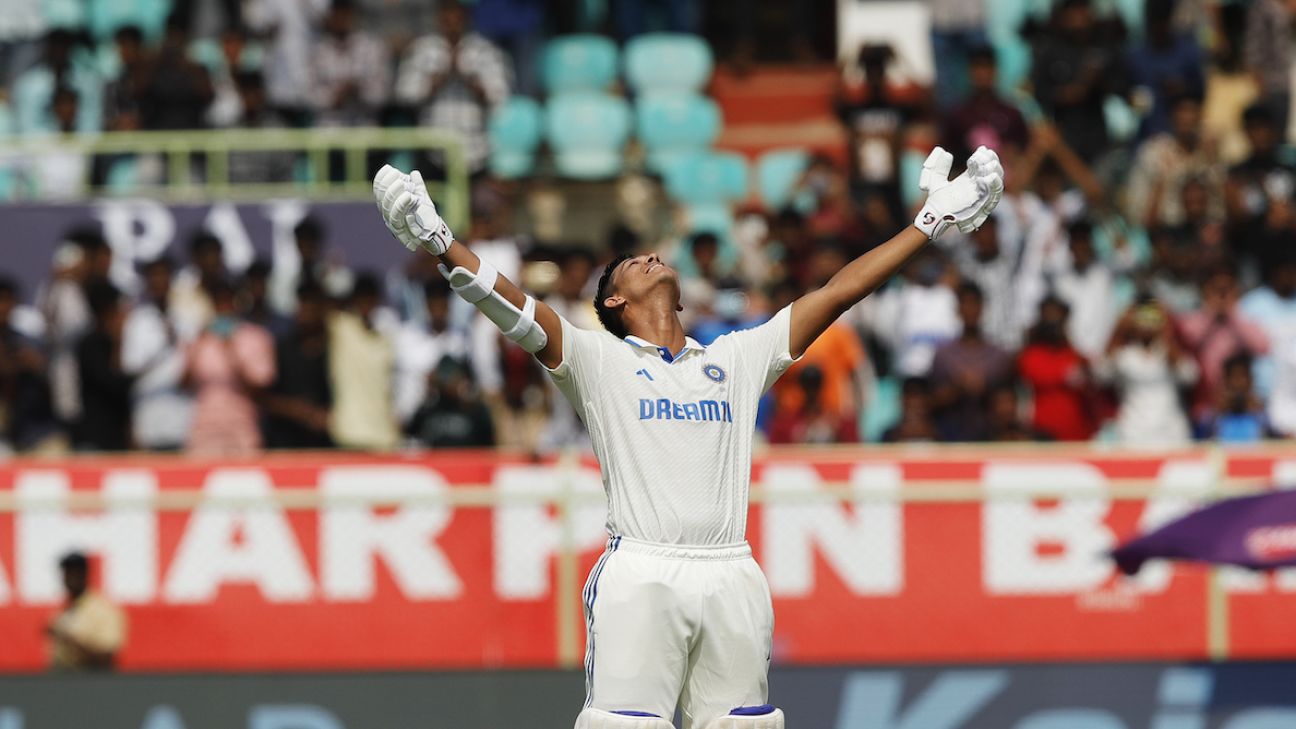[ad_1]
India 336 for 6 (Jaiswal 179*, Bashir 2-100, Ahmed 2-61) vs England
Anderson’s presence – in place of the pure head-hunter Mark Wood, whose energetic efforts had gone wicketless in Hyderabad – offered a degree of control that Ben Stokes had been obliged to do without in the first Test. His infinitesimal command of each-way movement produced an economy-rate of 1.76 that was less than half that of any of his team-mates, and helped to ensure that – unlike in Hyderabad, where all the first-day focus had fallen on Tom Hartley’s struggle for control – this week’s new boy was nothing less than a good-news story.
Irrespective of Jaiswal’s fluency alongside him, Rohit Sharma had dug himself in for the long haul in making 14 boundary-less runs from 41 balls after winning the toss, the consequence of which was that Bashir had not only settled into his rhythm after entering the attack in the 12th over, but had been rewarded with a leg-slip to crank up the pressure. Cue a closed-face clip at a regulation offbreak, and a sharp take from Ollie Pope to pick off India’s captain against the apparent run of play.
The same pattern would repeat itself as the day progressed. Gill, under extreme pressure for his place, started his innings watchfully with 17 from his first 36 balls, only for a sudden flurry of boundaries to prove his downfall. Two of these were classy cover-drives as Bashir over-pitched, but the other two were streaky edges off Anderson, who simply adjusted his line on the same probing full length, and induced a nicked drive to Ben Foakes for 34. It was the fifth time in seven innings that Anderson had got his man, at a cost of 7.8 runs per go, and as India went to lunch on 103 for 2, the session’s honours were broadly even.
Only one man fell between lunch and tea – Shreyas Iyer, superbly caught by Foakes for 27, as he stayed low with a scuttling delivery from Hartley and clung onto an under-edged cut that could easily have nutmegged him. But Jaiswal by this stage had soared past his century – arms afloat in celebration after a mic-dropping of his bat – and when Rajat Patidar unfurled England’s signature stroke from Hyderabad, the reverse-sweep for four, it seemed India’s debutant had brought with him precisely the sort of youthful verve to complement that of his team-mate.
But England would not be denied in their optimistic hunt for wickets. Rehan, held back until the 60th over, took up a central role in the attack for the final session, serving up 16 overs before stumps and picking off two priceless wickets in the process. On 32, Patidar failed to smother a top-spinning legbreak that rolled down the face of his bat and back into his stumps, and with the shadows lengthening, KS Bharat rocked back on a limp cut and gave his own innings away for 17.
By then, Bashir had already claimed his second, and in similar circumstances too, as Axar Patel – India’s key allrounder in Ravindra Jadeja’s absence – failed to get on top of his own cut to pick out Rehan at backward point.
But thankfully for India, nothing could slow down Jaiswal, whose wagon-wheel revealed shots all round the ground, but whose command in front of square was exceptional. One six off Rehan, a gallop to the pitch from round the wicket and an inside-out drill over extra cover, defied geometry.
He had a couple of near-misses on the cut – Root twice got fingertips to tough chances – and a handful of wild hacks against Bashir that nearly cost him, but the bravery to take the game on was precisely what India had lacked at the key moments in the first Test. Whether he’s yet done enough to cover for his off-colour team-mates, however, remains to be seen.
Andrew Miller is UK editor of ESPNcricinfo. @miller_cricket
[ad_2]
Source link

